Exploring Ethical Decision-Making and Corporate Social Responsibility
VerifiedAdded on 2023/01/09
|14
|4286
|1
Essay
AI Summary
This essay critically reflects on ethical dilemmas in business decision-making, emphasizing that ethical choices are rarely straightforward. It discusses the challenges of balancing rules with relationships, especially in leadership roles. The essay then explores corporate social responsibility (CSR) using Carroll's Pyramid, examining economic, legal, ethical, and philanthropic responsibilities. It highlights the importance of CSR in today's business environment, emphasizing how companies must operate ethically and sustainably. The essay stresses that CSR goes beyond profit, requiring businesses to consider their impact on society and the environment. It concludes by reinforcing the significance of integrating CSR into business models to build strong relationships with stakeholders and enhance financial performance. The essay draws on various academic sources to support its arguments, providing a comprehensive overview of ethical considerations and social responsibility in the business context.
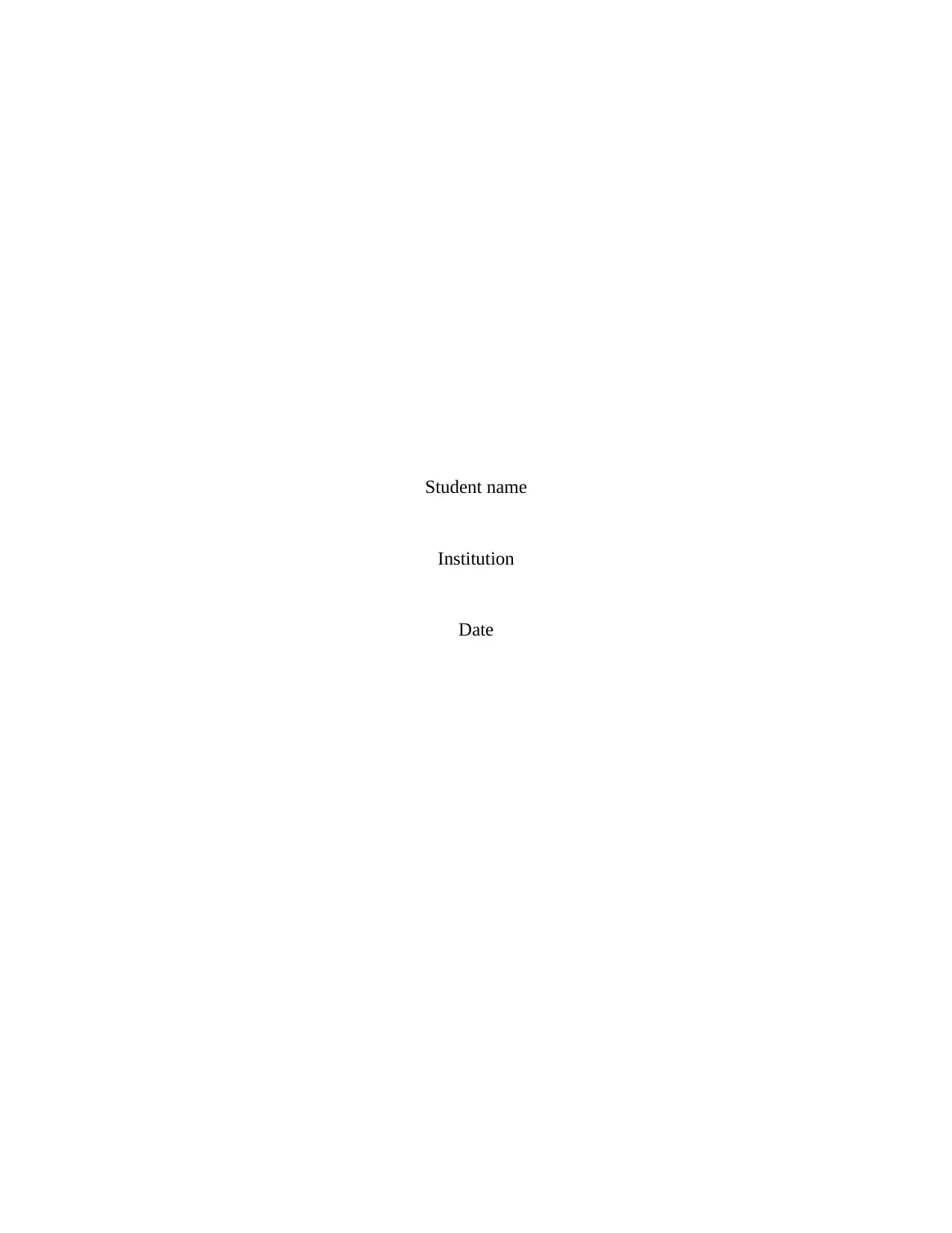
Student name
Institution
Date
Institution
Date
Paraphrase This Document
Need a fresh take? Get an instant paraphrase of this document with our AI Paraphraser

Q.2. Drawing on the discussion on ethical dilemmas, please critically reflect on the
following statement: ‘Ethical decision making is not a simple choice between right and
wrong
When I reflect on my time thus far, there is one ethical dilemma that leaps out to me most.
Finding the right balance between enforcing rules and cultivating friendships with girls can be
challenging. Being a good friend is one of the most important things I value in myself. I think I've
done a decent job as President of being a good friend and being available for girls when they need
me. That being said, I've been made aware of a number of disciplinary instances involving several
of my friends. This puts me in a precarious position since I must divide my connection with these
girls and hold them accountable for their conduct. If these girls are upset, I still want them to know
that I am here for them as a friend. Being compassionate with girls is difficult for the President,
though, because they are well-versed in the rules and must comprehend the ramifications of their
acts (Lo, 2009).
On the other hand, that’s in organizations, its challenging, organizational decisions are
also referred to as "dilemmas" due to the fact that they are based on fundamental conflicts
between opposing sets of economic, legal, and social interests. In light of these conflicting
considerations, different options are recommended in different situations (Flicker et al., 2004).
Despite the advantages of coming up with innovative ideas, there will always be some degree of
disagreement in each situation. Others believe that firms and managers should only examine
economic (organizational self-interest) concerns when attempting to reconcile these seemingly
opposing elements, rather than any other ones. Overemphasizing the social duties of a
corporation and its executives can be a convenient way to get things done quickly. The battle is,
following statement: ‘Ethical decision making is not a simple choice between right and
wrong
When I reflect on my time thus far, there is one ethical dilemma that leaps out to me most.
Finding the right balance between enforcing rules and cultivating friendships with girls can be
challenging. Being a good friend is one of the most important things I value in myself. I think I've
done a decent job as President of being a good friend and being available for girls when they need
me. That being said, I've been made aware of a number of disciplinary instances involving several
of my friends. This puts me in a precarious position since I must divide my connection with these
girls and hold them accountable for their conduct. If these girls are upset, I still want them to know
that I am here for them as a friend. Being compassionate with girls is difficult for the President,
though, because they are well-versed in the rules and must comprehend the ramifications of their
acts (Lo, 2009).
On the other hand, that’s in organizations, its challenging, organizational decisions are
also referred to as "dilemmas" due to the fact that they are based on fundamental conflicts
between opposing sets of economic, legal, and social interests. In light of these conflicting
considerations, different options are recommended in different situations (Flicker et al., 2004).
Despite the advantages of coming up with innovative ideas, there will always be some degree of
disagreement in each situation. Others believe that firms and managers should only examine
economic (organizational self-interest) concerns when attempting to reconcile these seemingly
opposing elements, rather than any other ones. Overemphasizing the social duties of a
corporation and its executives can be a convenient way to get things done quickly. The battle is,

in my opinion, the most difficult aspect of achieving a balance between opposing goals and
considerations.
In decisions and behaviors that have an impact on others, ethics is concerned with the
distinction between what is "right" and "wrong," "fair" and "unfair." It is the things that we
appreciate and respect greatly that serve as the foundation for our ethical worldview. "Values"
refer to what humans perceive to be "good," "desirable," "just," and deserving of consideration in
their actions and relationships with one another (Robert et al., 2020). We make judgments and
carry out actions in accordance with these principles (values).For a multitude of reasons,
reaching an ethical conclusion is almost always a tough proposition to accomplish. When faced
with an ethical dilemma, there are multiple alternatives, effects that extend beyond the
immediate situation, ambiguity about the outcome, a mix of economic and legal benefits and
costs, as well as social and personal aspects, to consider. In most cases, organizational ethical
issues do not boil down to simple black-and-white choices between right and wrong; rather, they
entail nuanced calculations that weigh the benefits and costs of economic and self-interest
considerations against legal, ethical, and societal considerations, among other things. As a result,
a diverse range of stakeholders and constituencies, each with its own set of goals and interests,
are involved in making ethical decisions. A variety of motives, including personal gain, power,
(a) competitiveness, and (b) the restoration of justice or fairness, are all examples of factors that
might lead to unethical behavior in some situations. Inevitably, various people will have vastly
diverse interpretations of what constitutes "justice" and "fairness."
We base our actions and judgments on an ethical framework or system, yet these
frameworks are often implicit, rarely questioned, and inconsistently executed. It is beneficial to
make our beliefs and implicit ethical systems (Ehrich et al., 2011) explicit to ourselves in order
considerations.
In decisions and behaviors that have an impact on others, ethics is concerned with the
distinction between what is "right" and "wrong," "fair" and "unfair." It is the things that we
appreciate and respect greatly that serve as the foundation for our ethical worldview. "Values"
refer to what humans perceive to be "good," "desirable," "just," and deserving of consideration in
their actions and relationships with one another (Robert et al., 2020). We make judgments and
carry out actions in accordance with these principles (values).For a multitude of reasons,
reaching an ethical conclusion is almost always a tough proposition to accomplish. When faced
with an ethical dilemma, there are multiple alternatives, effects that extend beyond the
immediate situation, ambiguity about the outcome, a mix of economic and legal benefits and
costs, as well as social and personal aspects, to consider. In most cases, organizational ethical
issues do not boil down to simple black-and-white choices between right and wrong; rather, they
entail nuanced calculations that weigh the benefits and costs of economic and self-interest
considerations against legal, ethical, and societal considerations, among other things. As a result,
a diverse range of stakeholders and constituencies, each with its own set of goals and interests,
are involved in making ethical decisions. A variety of motives, including personal gain, power,
(a) competitiveness, and (b) the restoration of justice or fairness, are all examples of factors that
might lead to unethical behavior in some situations. Inevitably, various people will have vastly
diverse interpretations of what constitutes "justice" and "fairness."
We base our actions and judgments on an ethical framework or system, yet these
frameworks are often implicit, rarely questioned, and inconsistently executed. It is beneficial to
make our beliefs and implicit ethical systems (Ehrich et al., 2011) explicit to ourselves in order
⊘ This is a preview!⊘
Do you want full access?
Subscribe today to unlock all pages.

Trusted by 1+ million students worldwide
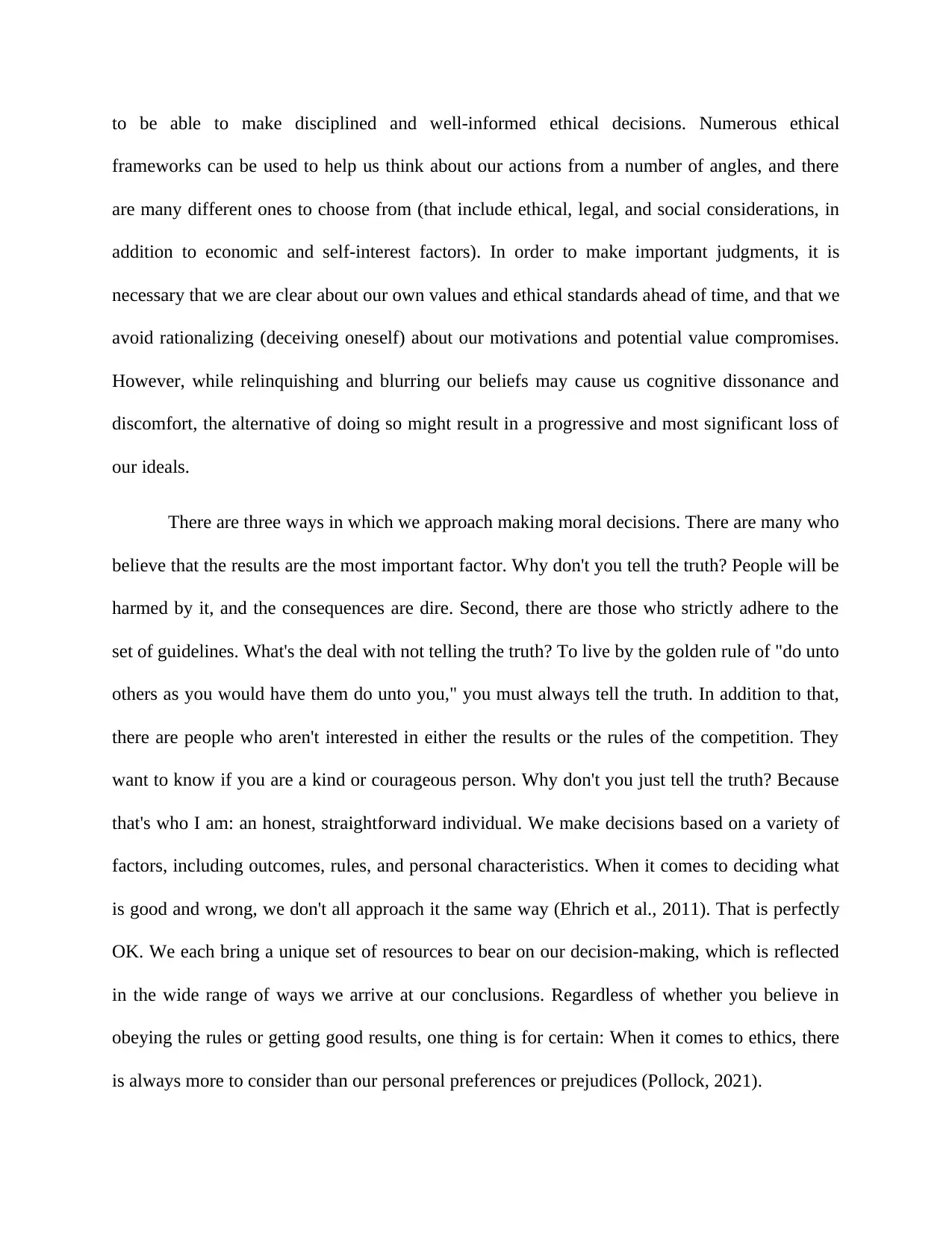
to be able to make disciplined and well-informed ethical decisions. Numerous ethical
frameworks can be used to help us think about our actions from a number of angles, and there
are many different ones to choose from (that include ethical, legal, and social considerations, in
addition to economic and self-interest factors). In order to make important judgments, it is
necessary that we are clear about our own values and ethical standards ahead of time, and that we
avoid rationalizing (deceiving oneself) about our motivations and potential value compromises.
However, while relinquishing and blurring our beliefs may cause us cognitive dissonance and
discomfort, the alternative of doing so might result in a progressive and most significant loss of
our ideals.
There are three ways in which we approach making moral decisions. There are many who
believe that the results are the most important factor. Why don't you tell the truth? People will be
harmed by it, and the consequences are dire. Second, there are those who strictly adhere to the
set of guidelines. What's the deal with not telling the truth? To live by the golden rule of "do unto
others as you would have them do unto you," you must always tell the truth. In addition to that,
there are people who aren't interested in either the results or the rules of the competition. They
want to know if you are a kind or courageous person. Why don't you just tell the truth? Because
that's who I am: an honest, straightforward individual. We make decisions based on a variety of
factors, including outcomes, rules, and personal characteristics. When it comes to deciding what
is good and wrong, we don't all approach it the same way (Ehrich et al., 2011). That is perfectly
OK. We each bring a unique set of resources to bear on our decision-making, which is reflected
in the wide range of ways we arrive at our conclusions. Regardless of whether you believe in
obeying the rules or getting good results, one thing is for certain: When it comes to ethics, there
is always more to consider than our personal preferences or prejudices (Pollock, 2021).
frameworks can be used to help us think about our actions from a number of angles, and there
are many different ones to choose from (that include ethical, legal, and social considerations, in
addition to economic and self-interest factors). In order to make important judgments, it is
necessary that we are clear about our own values and ethical standards ahead of time, and that we
avoid rationalizing (deceiving oneself) about our motivations and potential value compromises.
However, while relinquishing and blurring our beliefs may cause us cognitive dissonance and
discomfort, the alternative of doing so might result in a progressive and most significant loss of
our ideals.
There are three ways in which we approach making moral decisions. There are many who
believe that the results are the most important factor. Why don't you tell the truth? People will be
harmed by it, and the consequences are dire. Second, there are those who strictly adhere to the
set of guidelines. What's the deal with not telling the truth? To live by the golden rule of "do unto
others as you would have them do unto you," you must always tell the truth. In addition to that,
there are people who aren't interested in either the results or the rules of the competition. They
want to know if you are a kind or courageous person. Why don't you just tell the truth? Because
that's who I am: an honest, straightforward individual. We make decisions based on a variety of
factors, including outcomes, rules, and personal characteristics. When it comes to deciding what
is good and wrong, we don't all approach it the same way (Ehrich et al., 2011). That is perfectly
OK. We each bring a unique set of resources to bear on our decision-making, which is reflected
in the wide range of ways we arrive at our conclusions. Regardless of whether you believe in
obeying the rules or getting good results, one thing is for certain: When it comes to ethics, there
is always more to consider than our personal preferences or prejudices (Pollock, 2021).
Paraphrase This Document
Need a fresh take? Get an instant paraphrase of this document with our AI Paraphraser

Q.5. Social responsibility is a concept that is increasingly important to business, especially
in this age of increased transparency due to social media. Please use Carrol’s Pyramid to
support your answer.
CSR (Corporate Social Responsibility) is a topic that is becoming more important in
today's business environment. CSR is all about doing business ethically and sustainably, which
entails adopting ethical and sustainable policies and processes into your operations to decrease
your environmental and social effect (Afrah and Rani, 2017). Carroll's CSR Pyramid is a
straightforward model that explains why firms should meet their social responsibilities while still
increasing profitability. In this perspective, Archie Carroll suggests four distinct corporate duties,
shown on a pyramid. Profit, according to Carroll, is crucial, but business also serves a wider
purpose in terms of social obligation and responsibility. He developed the notion of corporate
social responsibility, which outlines how a company conducts business responsibly and ensures
that it has a positive ethical, legal, and economic impact on society (Nalband and Kelabi, 2014).
Carroll's CSR pyramid includes four kinds of responsibility and explains how a firm should
address its social responsibilities.
in this age of increased transparency due to social media. Please use Carrol’s Pyramid to
support your answer.
CSR (Corporate Social Responsibility) is a topic that is becoming more important in
today's business environment. CSR is all about doing business ethically and sustainably, which
entails adopting ethical and sustainable policies and processes into your operations to decrease
your environmental and social effect (Afrah and Rani, 2017). Carroll's CSR Pyramid is a
straightforward model that explains why firms should meet their social responsibilities while still
increasing profitability. In this perspective, Archie Carroll suggests four distinct corporate duties,
shown on a pyramid. Profit, according to Carroll, is crucial, but business also serves a wider
purpose in terms of social obligation and responsibility. He developed the notion of corporate
social responsibility, which outlines how a company conducts business responsibly and ensures
that it has a positive ethical, legal, and economic impact on society (Nalband and Kelabi, 2014).
Carroll's CSR pyramid includes four kinds of responsibility and explains how a firm should
address its social responsibilities.
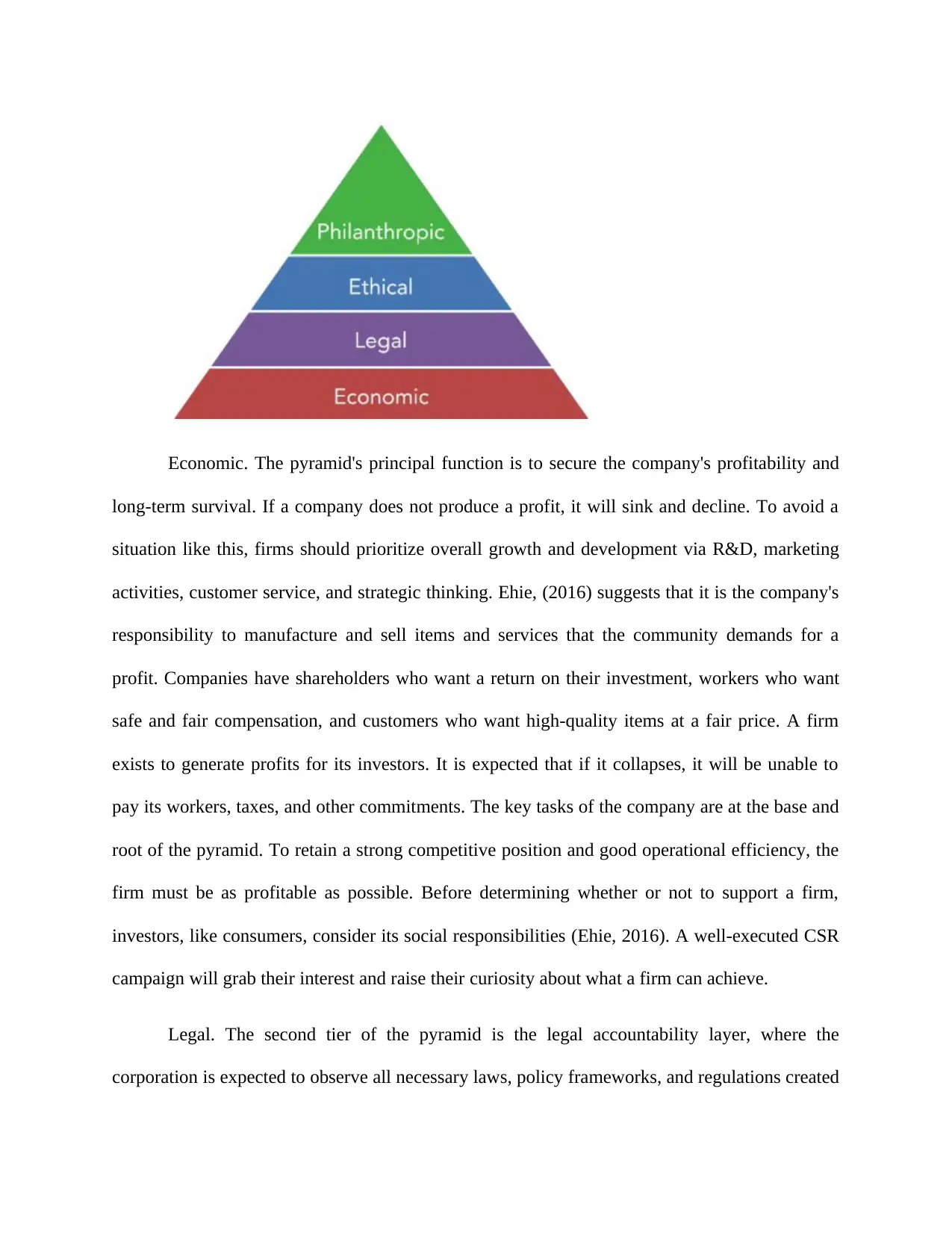
Economic. The pyramid's principal function is to secure the company's profitability and
long-term survival. If a company does not produce a profit, it will sink and decline. To avoid a
situation like this, firms should prioritize overall growth and development via R&D, marketing
activities, customer service, and strategic thinking. Ehie, (2016) suggests that it is the company's
responsibility to manufacture and sell items and services that the community demands for a
profit. Companies have shareholders who want a return on their investment, workers who want
safe and fair compensation, and customers who want high-quality items at a fair price. A firm
exists to generate profits for its investors. It is expected that if it collapses, it will be unable to
pay its workers, taxes, and other commitments. The key tasks of the company are at the base and
root of the pyramid. To retain a strong competitive position and good operational efficiency, the
firm must be as profitable as possible. Before determining whether or not to support a firm,
investors, like consumers, consider its social responsibilities (Ehie, 2016). A well-executed CSR
campaign will grab their interest and raise their curiosity about what a firm can achieve.
Legal. The second tier of the pyramid is the legal accountability layer, where the
corporation is expected to observe all necessary laws, policy frameworks, and regulations created
long-term survival. If a company does not produce a profit, it will sink and decline. To avoid a
situation like this, firms should prioritize overall growth and development via R&D, marketing
activities, customer service, and strategic thinking. Ehie, (2016) suggests that it is the company's
responsibility to manufacture and sell items and services that the community demands for a
profit. Companies have shareholders who want a return on their investment, workers who want
safe and fair compensation, and customers who want high-quality items at a fair price. A firm
exists to generate profits for its investors. It is expected that if it collapses, it will be unable to
pay its workers, taxes, and other commitments. The key tasks of the company are at the base and
root of the pyramid. To retain a strong competitive position and good operational efficiency, the
firm must be as profitable as possible. Before determining whether or not to support a firm,
investors, like consumers, consider its social responsibilities (Ehie, 2016). A well-executed CSR
campaign will grab their interest and raise their curiosity about what a firm can achieve.
Legal. The second tier of the pyramid is the legal accountability layer, where the
corporation is expected to observe all necessary laws, policy frameworks, and regulations created
⊘ This is a preview!⊘
Do you want full access?
Subscribe today to unlock all pages.

Trusted by 1+ million students worldwide
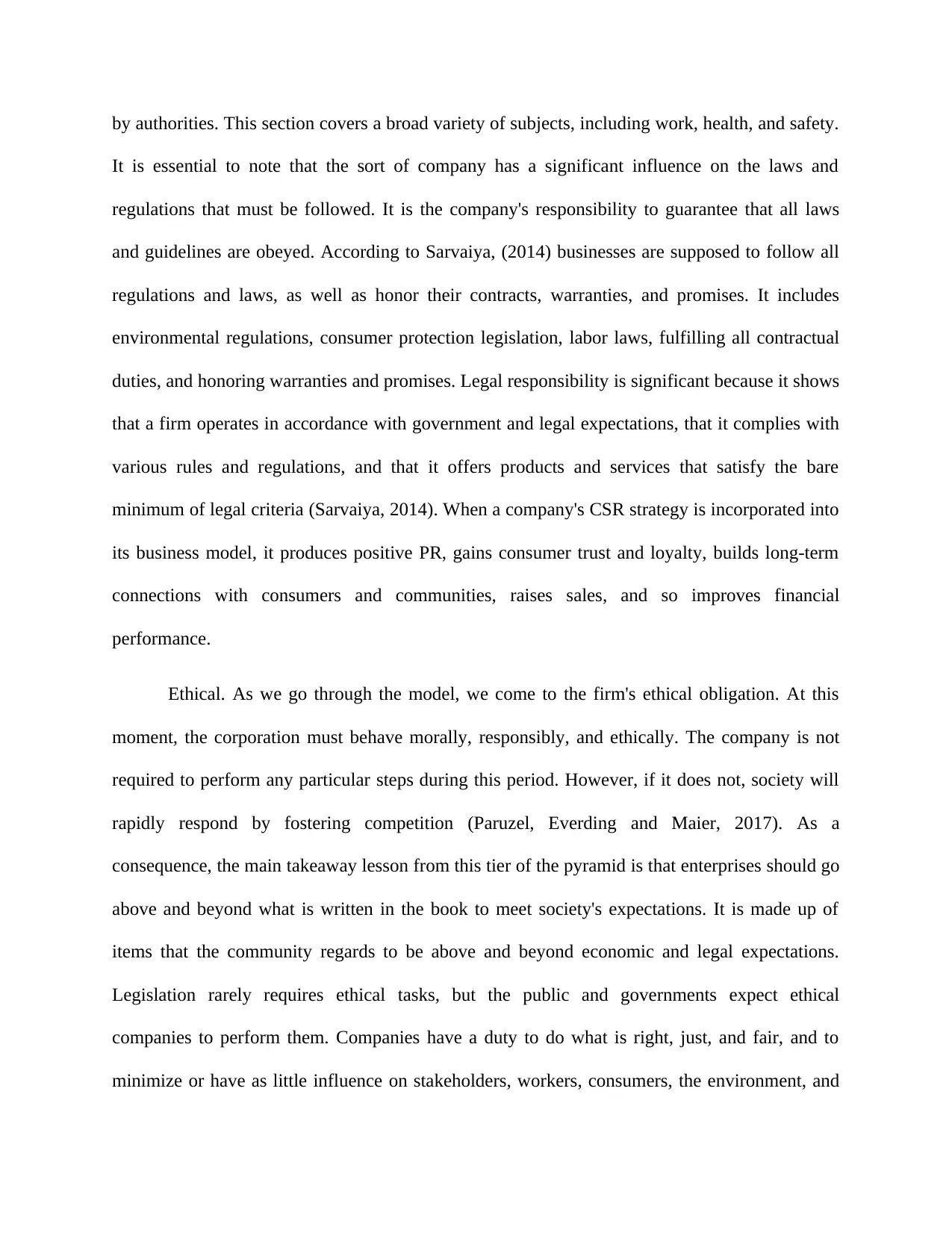
by authorities. This section covers a broad variety of subjects, including work, health, and safety.
It is essential to note that the sort of company has a significant influence on the laws and
regulations that must be followed. It is the company's responsibility to guarantee that all laws
and guidelines are obeyed. According to Sarvaiya, (2014) businesses are supposed to follow all
regulations and laws, as well as honor their contracts, warranties, and promises. It includes
environmental regulations, consumer protection legislation, labor laws, fulfilling all contractual
duties, and honoring warranties and promises. Legal responsibility is significant because it shows
that a firm operates in accordance with government and legal expectations, that it complies with
various rules and regulations, and that it offers products and services that satisfy the bare
minimum of legal criteria (Sarvaiya, 2014). When a company's CSR strategy is incorporated into
its business model, it produces positive PR, gains consumer trust and loyalty, builds long-term
connections with consumers and communities, raises sales, and so improves financial
performance.
Ethical. As we go through the model, we come to the firm's ethical obligation. At this
moment, the corporation must behave morally, responsibly, and ethically. The company is not
required to perform any particular steps during this period. However, if it does not, society will
rapidly respond by fostering competition (Paruzel, Everding and Maier, 2017). As a
consequence, the main takeaway lesson from this tier of the pyramid is that enterprises should go
above and beyond what is written in the book to meet society's expectations. It is made up of
items that the community regards to be above and beyond economic and legal expectations.
Legislation rarely requires ethical tasks, but the public and governments expect ethical
companies to perform them. Companies have a duty to do what is right, just, and fair, and to
minimize or have as little influence on stakeholders, workers, consumers, the environment, and
It is essential to note that the sort of company has a significant influence on the laws and
regulations that must be followed. It is the company's responsibility to guarantee that all laws
and guidelines are obeyed. According to Sarvaiya, (2014) businesses are supposed to follow all
regulations and laws, as well as honor their contracts, warranties, and promises. It includes
environmental regulations, consumer protection legislation, labor laws, fulfilling all contractual
duties, and honoring warranties and promises. Legal responsibility is significant because it shows
that a firm operates in accordance with government and legal expectations, that it complies with
various rules and regulations, and that it offers products and services that satisfy the bare
minimum of legal criteria (Sarvaiya, 2014). When a company's CSR strategy is incorporated into
its business model, it produces positive PR, gains consumer trust and loyalty, builds long-term
connections with consumers and communities, raises sales, and so improves financial
performance.
Ethical. As we go through the model, we come to the firm's ethical obligation. At this
moment, the corporation must behave morally, responsibly, and ethically. The company is not
required to perform any particular steps during this period. However, if it does not, society will
rapidly respond by fostering competition (Paruzel, Everding and Maier, 2017). As a
consequence, the main takeaway lesson from this tier of the pyramid is that enterprises should go
above and beyond what is written in the book to meet society's expectations. It is made up of
items that the community regards to be above and beyond economic and legal expectations.
Legislation rarely requires ethical tasks, but the public and governments expect ethical
companies to perform them. Companies have a duty to do what is right, just, and fair, and to
minimize or have as little influence on stakeholders, workers, consumers, the environment, and
Paraphrase This Document
Need a fresh take? Get an instant paraphrase of this document with our AI Paraphraser
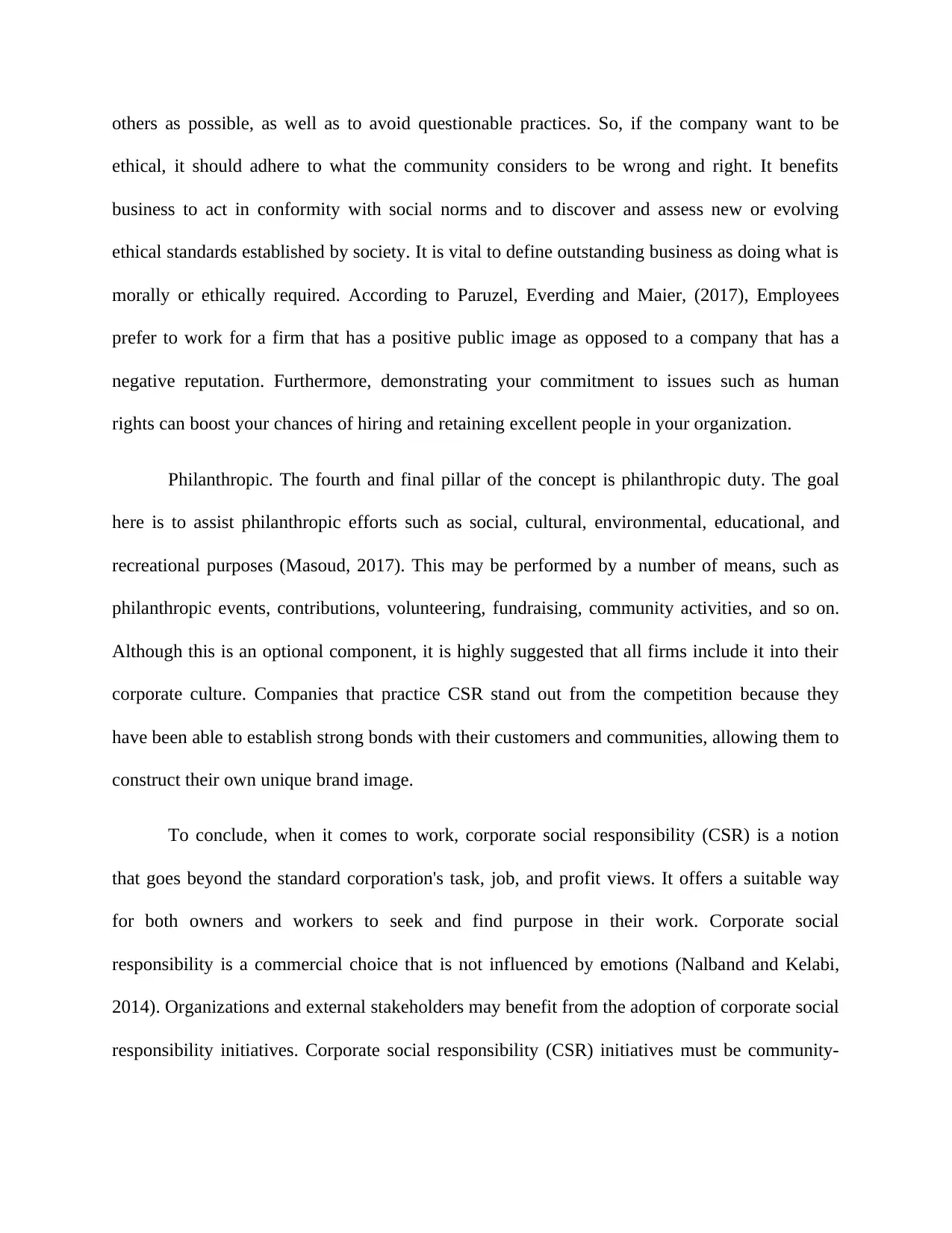
others as possible, as well as to avoid questionable practices. So, if the company want to be
ethical, it should adhere to what the community considers to be wrong and right. It benefits
business to act in conformity with social norms and to discover and assess new or evolving
ethical standards established by society. It is vital to define outstanding business as doing what is
morally or ethically required. According to Paruzel, Everding and Maier, (2017), Employees
prefer to work for a firm that has a positive public image as opposed to a company that has a
negative reputation. Furthermore, demonstrating your commitment to issues such as human
rights can boost your chances of hiring and retaining excellent people in your organization.
Philanthropic. The fourth and final pillar of the concept is philanthropic duty. The goal
here is to assist philanthropic efforts such as social, cultural, environmental, educational, and
recreational purposes (Masoud, 2017). This may be performed by a number of means, such as
philanthropic events, contributions, volunteering, fundraising, community activities, and so on.
Although this is an optional component, it is highly suggested that all firms include it into their
corporate culture. Companies that practice CSR stand out from the competition because they
have been able to establish strong bonds with their customers and communities, allowing them to
construct their own unique brand image.
To conclude, when it comes to work, corporate social responsibility (CSR) is a notion
that goes beyond the standard corporation's task, job, and profit views. It offers a suitable way
for both owners and workers to seek and find purpose in their work. Corporate social
responsibility is a commercial choice that is not influenced by emotions (Nalband and Kelabi,
2014). Organizations and external stakeholders may benefit from the adoption of corporate social
responsibility initiatives. Corporate social responsibility (CSR) initiatives must be community-
ethical, it should adhere to what the community considers to be wrong and right. It benefits
business to act in conformity with social norms and to discover and assess new or evolving
ethical standards established by society. It is vital to define outstanding business as doing what is
morally or ethically required. According to Paruzel, Everding and Maier, (2017), Employees
prefer to work for a firm that has a positive public image as opposed to a company that has a
negative reputation. Furthermore, demonstrating your commitment to issues such as human
rights can boost your chances of hiring and retaining excellent people in your organization.
Philanthropic. The fourth and final pillar of the concept is philanthropic duty. The goal
here is to assist philanthropic efforts such as social, cultural, environmental, educational, and
recreational purposes (Masoud, 2017). This may be performed by a number of means, such as
philanthropic events, contributions, volunteering, fundraising, community activities, and so on.
Although this is an optional component, it is highly suggested that all firms include it into their
corporate culture. Companies that practice CSR stand out from the competition because they
have been able to establish strong bonds with their customers and communities, allowing them to
construct their own unique brand image.
To conclude, when it comes to work, corporate social responsibility (CSR) is a notion
that goes beyond the standard corporation's task, job, and profit views. It offers a suitable way
for both owners and workers to seek and find purpose in their work. Corporate social
responsibility is a commercial choice that is not influenced by emotions (Nalband and Kelabi,
2014). Organizations and external stakeholders may benefit from the adoption of corporate social
responsibility initiatives. Corporate social responsibility (CSR) initiatives must be community-
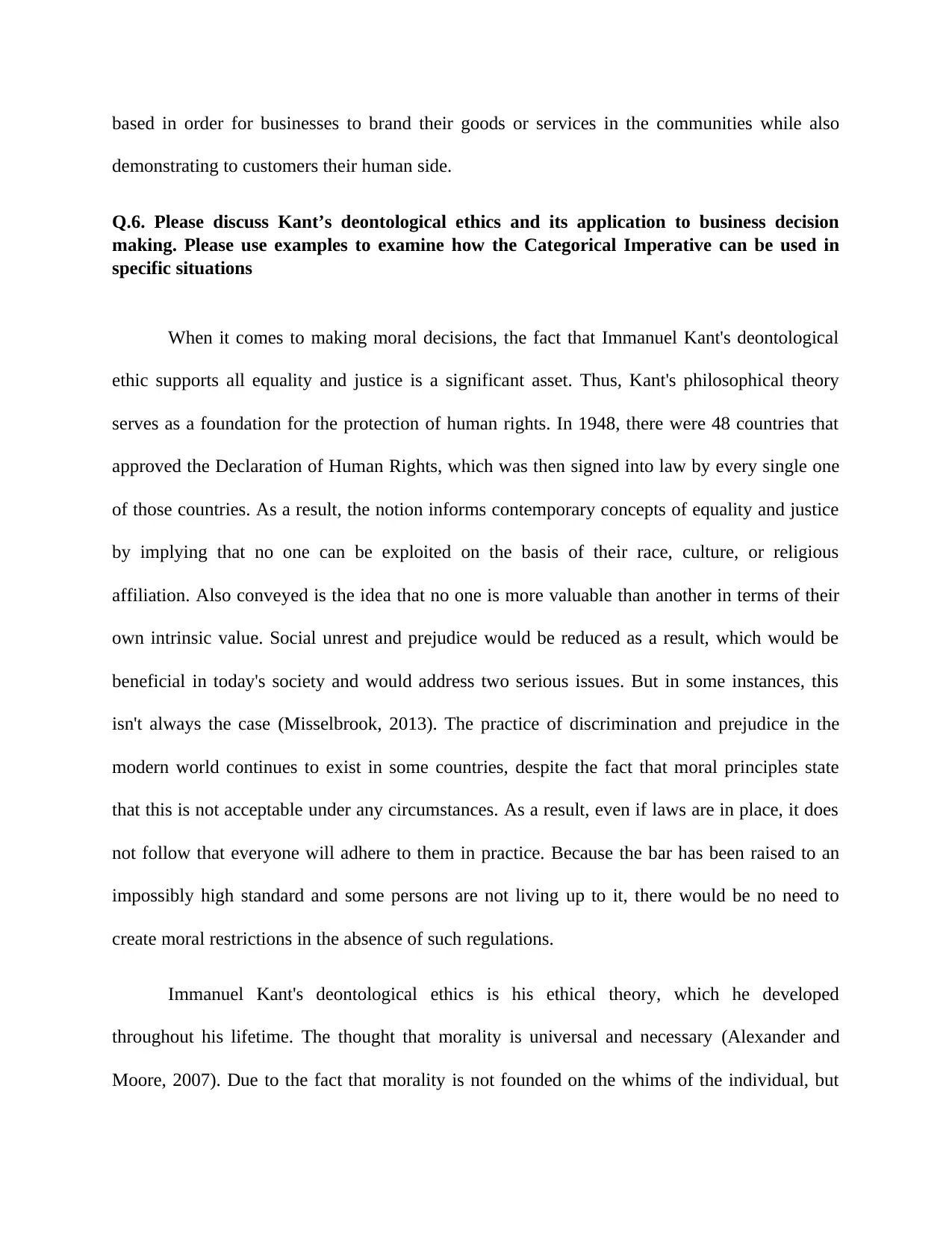
based in order for businesses to brand their goods or services in the communities while also
demonstrating to customers their human side.
Q.6. Please discuss Kant’s deontological ethics and its application to business decision
making. Please use examples to examine how the Categorical Imperative can be used in
specific situations
When it comes to making moral decisions, the fact that Immanuel Kant's deontological
ethic supports all equality and justice is a significant asset. Thus, Kant's philosophical theory
serves as a foundation for the protection of human rights. In 1948, there were 48 countries that
approved the Declaration of Human Rights, which was then signed into law by every single one
of those countries. As a result, the notion informs contemporary concepts of equality and justice
by implying that no one can be exploited on the basis of their race, culture, or religious
affiliation. Also conveyed is the idea that no one is more valuable than another in terms of their
own intrinsic value. Social unrest and prejudice would be reduced as a result, which would be
beneficial in today's society and would address two serious issues. But in some instances, this
isn't always the case (Misselbrook, 2013). The practice of discrimination and prejudice in the
modern world continues to exist in some countries, despite the fact that moral principles state
that this is not acceptable under any circumstances. As a result, even if laws are in place, it does
not follow that everyone will adhere to them in practice. Because the bar has been raised to an
impossibly high standard and some persons are not living up to it, there would be no need to
create moral restrictions in the absence of such regulations.
Immanuel Kant's deontological ethics is his ethical theory, which he developed
throughout his lifetime. The thought that morality is universal and necessary (Alexander and
Moore, 2007). Due to the fact that morality is not founded on the whims of the individual, but
demonstrating to customers their human side.
Q.6. Please discuss Kant’s deontological ethics and its application to business decision
making. Please use examples to examine how the Categorical Imperative can be used in
specific situations
When it comes to making moral decisions, the fact that Immanuel Kant's deontological
ethic supports all equality and justice is a significant asset. Thus, Kant's philosophical theory
serves as a foundation for the protection of human rights. In 1948, there were 48 countries that
approved the Declaration of Human Rights, which was then signed into law by every single one
of those countries. As a result, the notion informs contemporary concepts of equality and justice
by implying that no one can be exploited on the basis of their race, culture, or religious
affiliation. Also conveyed is the idea that no one is more valuable than another in terms of their
own intrinsic value. Social unrest and prejudice would be reduced as a result, which would be
beneficial in today's society and would address two serious issues. But in some instances, this
isn't always the case (Misselbrook, 2013). The practice of discrimination and prejudice in the
modern world continues to exist in some countries, despite the fact that moral principles state
that this is not acceptable under any circumstances. As a result, even if laws are in place, it does
not follow that everyone will adhere to them in practice. Because the bar has been raised to an
impossibly high standard and some persons are not living up to it, there would be no need to
create moral restrictions in the absence of such regulations.
Immanuel Kant's deontological ethics is his ethical theory, which he developed
throughout his lifetime. The thought that morality is universal and necessary (Alexander and
Moore, 2007). Due to the fact that morality is not founded on the whims of the individual, but
⊘ This is a preview!⊘
Do you want full access?
Subscribe today to unlock all pages.

Trusted by 1+ million students worldwide
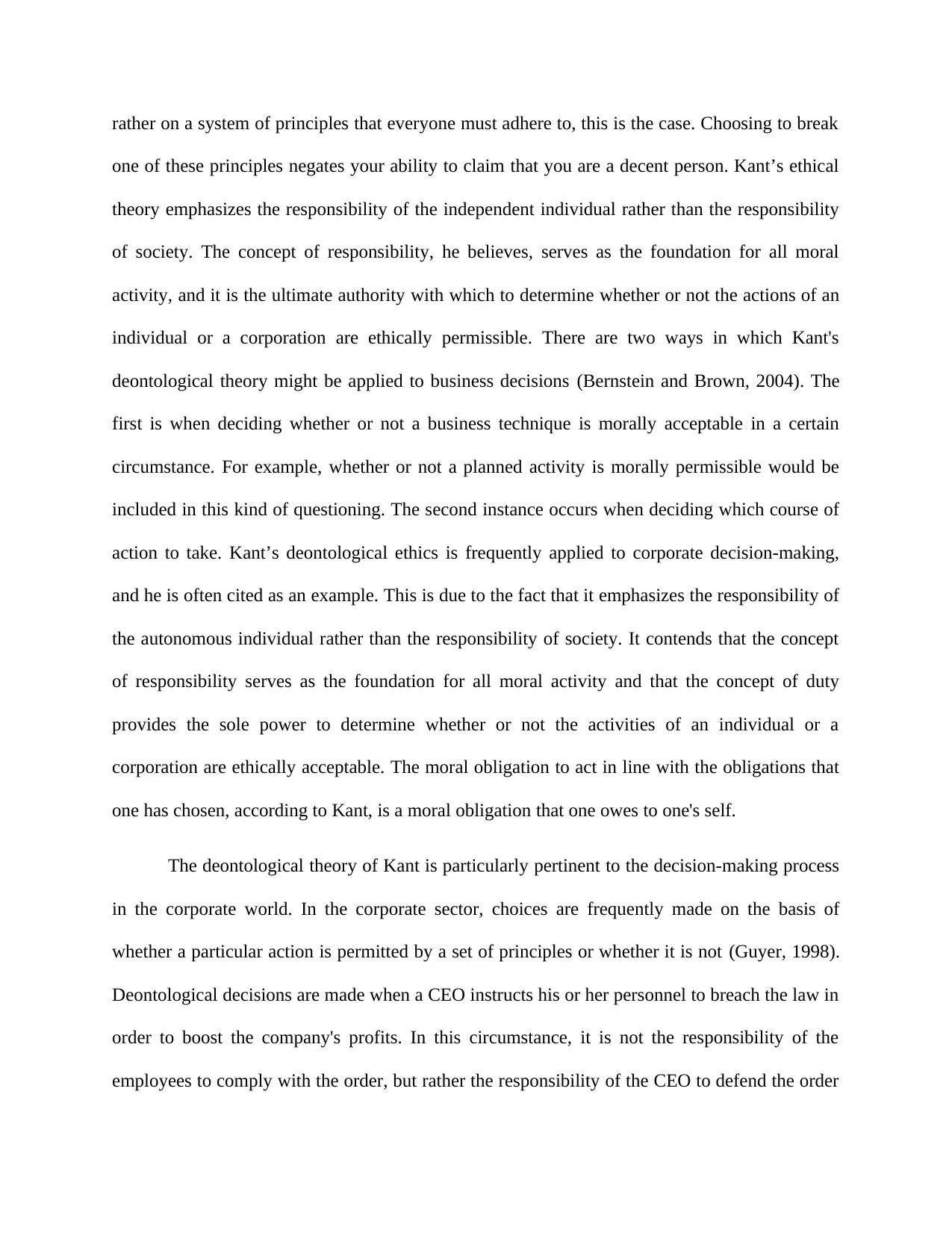
rather on a system of principles that everyone must adhere to, this is the case. Choosing to break
one of these principles negates your ability to claim that you are a decent person. Kant’s ethical
theory emphasizes the responsibility of the independent individual rather than the responsibility
of society. The concept of responsibility, he believes, serves as the foundation for all moral
activity, and it is the ultimate authority with which to determine whether or not the actions of an
individual or a corporation are ethically permissible. There are two ways in which Kant's
deontological theory might be applied to business decisions (Bernstein and Brown, 2004). The
first is when deciding whether or not a business technique is morally acceptable in a certain
circumstance. For example, whether or not a planned activity is morally permissible would be
included in this kind of questioning. The second instance occurs when deciding which course of
action to take. Kant’s deontological ethics is frequently applied to corporate decision-making,
and he is often cited as an example. This is due to the fact that it emphasizes the responsibility of
the autonomous individual rather than the responsibility of society. It contends that the concept
of responsibility serves as the foundation for all moral activity and that the concept of duty
provides the sole power to determine whether or not the activities of an individual or a
corporation are ethically acceptable. The moral obligation to act in line with the obligations that
one has chosen, according to Kant, is a moral obligation that one owes to one's self.
The deontological theory of Kant is particularly pertinent to the decision-making process
in the corporate world. In the corporate sector, choices are frequently made on the basis of
whether a particular action is permitted by a set of principles or whether it is not (Guyer, 1998).
Deontological decisions are made when a CEO instructs his or her personnel to breach the law in
order to boost the company's profits. In this circumstance, it is not the responsibility of the
employees to comply with the order, but rather the responsibility of the CEO to defend the order
one of these principles negates your ability to claim that you are a decent person. Kant’s ethical
theory emphasizes the responsibility of the independent individual rather than the responsibility
of society. The concept of responsibility, he believes, serves as the foundation for all moral
activity, and it is the ultimate authority with which to determine whether or not the actions of an
individual or a corporation are ethically permissible. There are two ways in which Kant's
deontological theory might be applied to business decisions (Bernstein and Brown, 2004). The
first is when deciding whether or not a business technique is morally acceptable in a certain
circumstance. For example, whether or not a planned activity is morally permissible would be
included in this kind of questioning. The second instance occurs when deciding which course of
action to take. Kant’s deontological ethics is frequently applied to corporate decision-making,
and he is often cited as an example. This is due to the fact that it emphasizes the responsibility of
the autonomous individual rather than the responsibility of society. It contends that the concept
of responsibility serves as the foundation for all moral activity and that the concept of duty
provides the sole power to determine whether or not the activities of an individual or a
corporation are ethically acceptable. The moral obligation to act in line with the obligations that
one has chosen, according to Kant, is a moral obligation that one owes to one's self.
The deontological theory of Kant is particularly pertinent to the decision-making process
in the corporate world. In the corporate sector, choices are frequently made on the basis of
whether a particular action is permitted by a set of principles or whether it is not (Guyer, 1998).
Deontological decisions are made when a CEO instructs his or her personnel to breach the law in
order to boost the company's profits. In this circumstance, it is not the responsibility of the
employees to comply with the order, but rather the responsibility of the CEO to defend the order
Paraphrase This Document
Need a fresh take? Get an instant paraphrase of this document with our AI Paraphraser
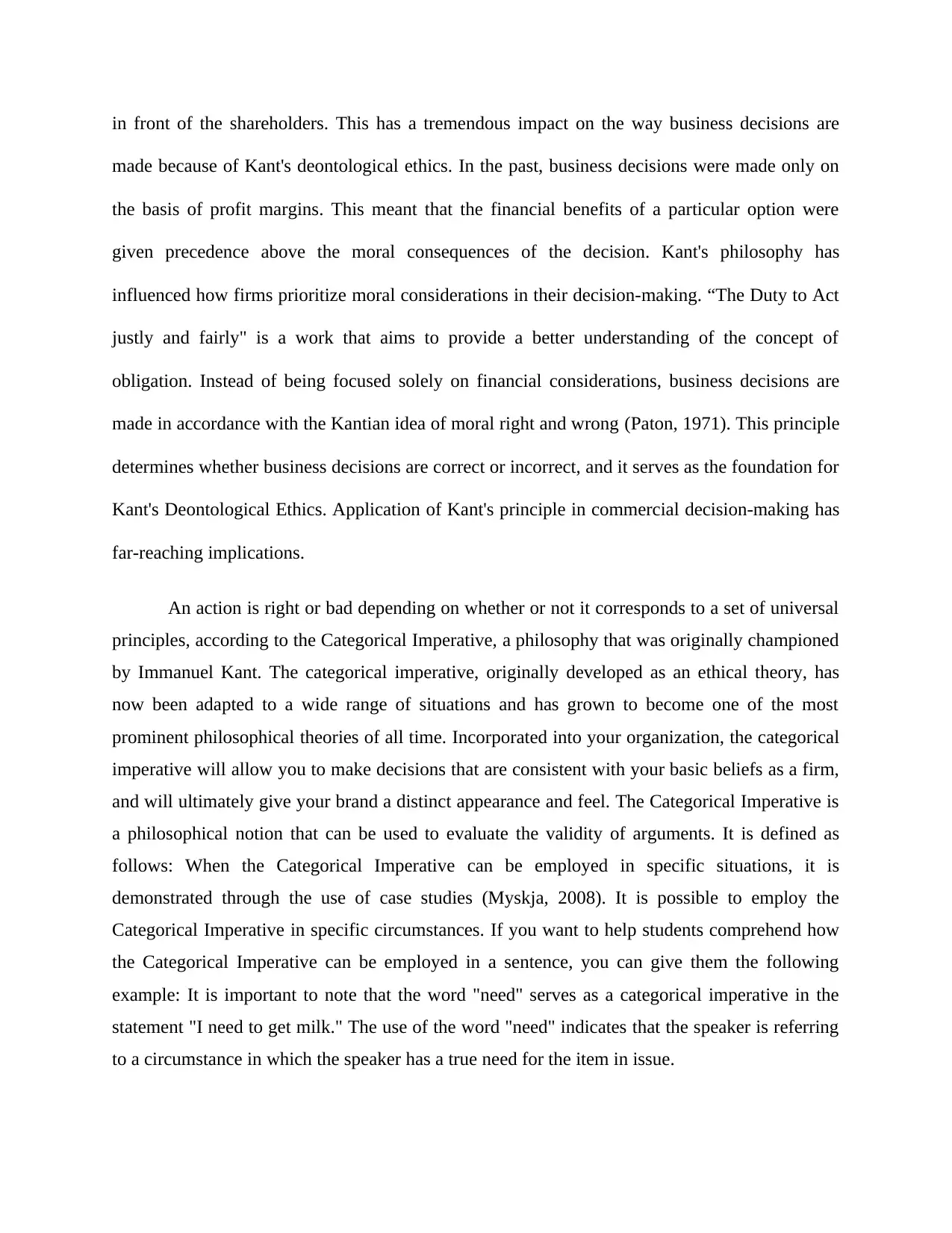
in front of the shareholders. This has a tremendous impact on the way business decisions are
made because of Kant's deontological ethics. In the past, business decisions were made only on
the basis of profit margins. This meant that the financial benefits of a particular option were
given precedence above the moral consequences of the decision. Kant's philosophy has
influenced how firms prioritize moral considerations in their decision-making. “The Duty to Act
justly and fairly" is a work that aims to provide a better understanding of the concept of
obligation. Instead of being focused solely on financial considerations, business decisions are
made in accordance with the Kantian idea of moral right and wrong (Paton, 1971). This principle
determines whether business decisions are correct or incorrect, and it serves as the foundation for
Kant's Deontological Ethics. Application of Kant's principle in commercial decision-making has
far-reaching implications.
An action is right or bad depending on whether or not it corresponds to a set of universal
principles, according to the Categorical Imperative, a philosophy that was originally championed
by Immanuel Kant. The categorical imperative, originally developed as an ethical theory, has
now been adapted to a wide range of situations and has grown to become one of the most
prominent philosophical theories of all time. Incorporated into your organization, the categorical
imperative will allow you to make decisions that are consistent with your basic beliefs as a firm,
and will ultimately give your brand a distinct appearance and feel. The Categorical Imperative is
a philosophical notion that can be used to evaluate the validity of arguments. It is defined as
follows: When the Categorical Imperative can be employed in specific situations, it is
demonstrated through the use of case studies (Myskja, 2008). It is possible to employ the
Categorical Imperative in specific circumstances. If you want to help students comprehend how
the Categorical Imperative can be employed in a sentence, you can give them the following
example: It is important to note that the word "need" serves as a categorical imperative in the
statement "I need to get milk." The use of the word "need" indicates that the speaker is referring
to a circumstance in which the speaker has a true need for the item in issue.
made because of Kant's deontological ethics. In the past, business decisions were made only on
the basis of profit margins. This meant that the financial benefits of a particular option were
given precedence above the moral consequences of the decision. Kant's philosophy has
influenced how firms prioritize moral considerations in their decision-making. “The Duty to Act
justly and fairly" is a work that aims to provide a better understanding of the concept of
obligation. Instead of being focused solely on financial considerations, business decisions are
made in accordance with the Kantian idea of moral right and wrong (Paton, 1971). This principle
determines whether business decisions are correct or incorrect, and it serves as the foundation for
Kant's Deontological Ethics. Application of Kant's principle in commercial decision-making has
far-reaching implications.
An action is right or bad depending on whether or not it corresponds to a set of universal
principles, according to the Categorical Imperative, a philosophy that was originally championed
by Immanuel Kant. The categorical imperative, originally developed as an ethical theory, has
now been adapted to a wide range of situations and has grown to become one of the most
prominent philosophical theories of all time. Incorporated into your organization, the categorical
imperative will allow you to make decisions that are consistent with your basic beliefs as a firm,
and will ultimately give your brand a distinct appearance and feel. The Categorical Imperative is
a philosophical notion that can be used to evaluate the validity of arguments. It is defined as
follows: When the Categorical Imperative can be employed in specific situations, it is
demonstrated through the use of case studies (Myskja, 2008). It is possible to employ the
Categorical Imperative in specific circumstances. If you want to help students comprehend how
the Categorical Imperative can be employed in a sentence, you can give them the following
example: It is important to note that the word "need" serves as a categorical imperative in the
statement "I need to get milk." The use of the word "need" indicates that the speaker is referring
to a circumstance in which the speaker has a true need for the item in issue.
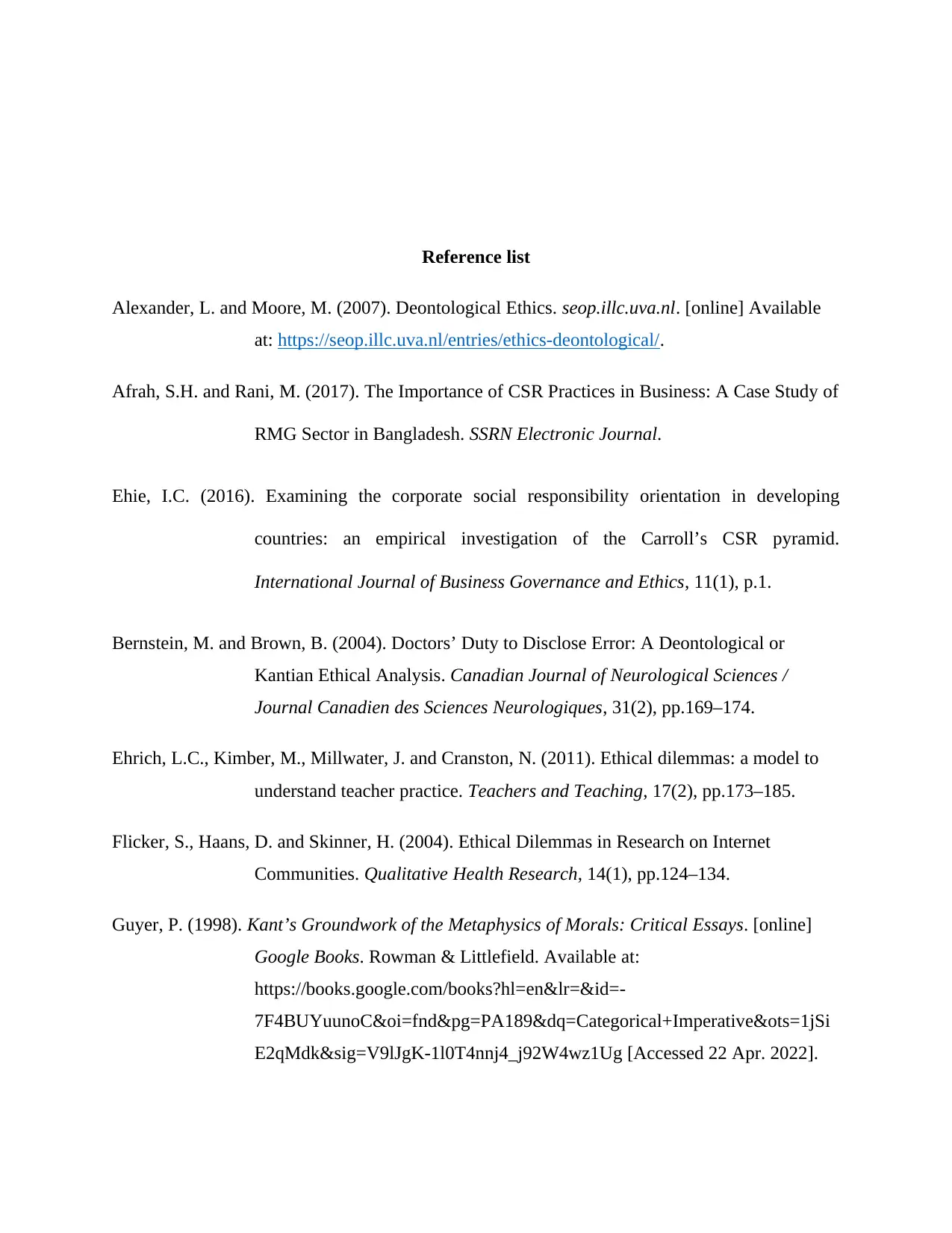
Reference list
Alexander, L. and Moore, M. (2007). Deontological Ethics. seop.illc.uva.nl. [online] Available
at: https://seop.illc.uva.nl/entries/ethics-deontological/.
Afrah, S.H. and Rani, M. (2017). The Importance of CSR Practices in Business: A Case Study of
RMG Sector in Bangladesh. SSRN Electronic Journal.
Ehie, I.C. (2016). Examining the corporate social responsibility orientation in developing
countries: an empirical investigation of the Carroll’s CSR pyramid.
International Journal of Business Governance and Ethics, 11(1), p.1.
Bernstein, M. and Brown, B. (2004). Doctors’ Duty to Disclose Error: A Deontological or
Kantian Ethical Analysis. Canadian Journal of Neurological Sciences /
Journal Canadien des Sciences Neurologiques, 31(2), pp.169–174.
Ehrich, L.C., Kimber, M., Millwater, J. and Cranston, N. (2011). Ethical dilemmas: a model to
understand teacher practice. Teachers and Teaching, 17(2), pp.173–185.
Flicker, S., Haans, D. and Skinner, H. (2004). Ethical Dilemmas in Research on Internet
Communities. Qualitative Health Research, 14(1), pp.124–134.
Guyer, P. (1998). Kant’s Groundwork of the Metaphysics of Morals: Critical Essays. [online]
Google Books. Rowman & Littlefield. Available at:
https://books.google.com/books?hl=en&lr=&id=-
7F4BUYuunoC&oi=fnd&pg=PA189&dq=Categorical+Imperative&ots=1jSi
E2qMdk&sig=V9lJgK-1l0T4nnj4_j92W4wz1Ug [Accessed 22 Apr. 2022].
Alexander, L. and Moore, M. (2007). Deontological Ethics. seop.illc.uva.nl. [online] Available
at: https://seop.illc.uva.nl/entries/ethics-deontological/.
Afrah, S.H. and Rani, M. (2017). The Importance of CSR Practices in Business: A Case Study of
RMG Sector in Bangladesh. SSRN Electronic Journal.
Ehie, I.C. (2016). Examining the corporate social responsibility orientation in developing
countries: an empirical investigation of the Carroll’s CSR pyramid.
International Journal of Business Governance and Ethics, 11(1), p.1.
Bernstein, M. and Brown, B. (2004). Doctors’ Duty to Disclose Error: A Deontological or
Kantian Ethical Analysis. Canadian Journal of Neurological Sciences /
Journal Canadien des Sciences Neurologiques, 31(2), pp.169–174.
Ehrich, L.C., Kimber, M., Millwater, J. and Cranston, N. (2011). Ethical dilemmas: a model to
understand teacher practice. Teachers and Teaching, 17(2), pp.173–185.
Flicker, S., Haans, D. and Skinner, H. (2004). Ethical Dilemmas in Research on Internet
Communities. Qualitative Health Research, 14(1), pp.124–134.
Guyer, P. (1998). Kant’s Groundwork of the Metaphysics of Morals: Critical Essays. [online]
Google Books. Rowman & Littlefield. Available at:
https://books.google.com/books?hl=en&lr=&id=-
7F4BUYuunoC&oi=fnd&pg=PA189&dq=Categorical+Imperative&ots=1jSi
E2qMdk&sig=V9lJgK-1l0T4nnj4_j92W4wz1Ug [Accessed 22 Apr. 2022].
⊘ This is a preview!⊘
Do you want full access?
Subscribe today to unlock all pages.

Trusted by 1+ million students worldwide
1 out of 14
Related Documents
Your All-in-One AI-Powered Toolkit for Academic Success.
+13062052269
info@desklib.com
Available 24*7 on WhatsApp / Email
![[object Object]](/_next/static/media/star-bottom.7253800d.svg)
Unlock your academic potential
Copyright © 2020–2026 A2Z Services. All Rights Reserved. Developed and managed by ZUCOL.





